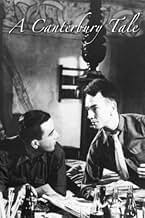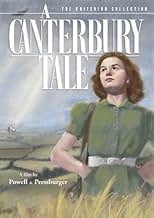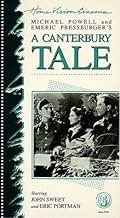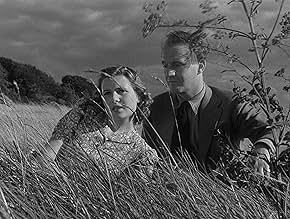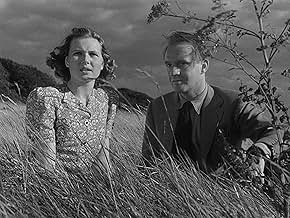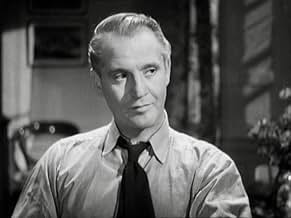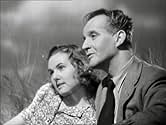Three modern-day pilgrims investigate a bizarre crime in a small town while on their way to Canterbury.Three modern-day pilgrims investigate a bizarre crime in a small town while on their way to Canterbury.Three modern-day pilgrims investigate a bizarre crime in a small town while on their way to Canterbury.
- Directors
- Writers
- Stars
- Sergeant Bob Johnson
- (as Sergt. John Sweet U.S. Army)
- Sergt. Bassett
- (as Antony Holles)
- Directors
- Writers
- All cast & crew
- Production, box office & more at IMDbPro
Featured reviews
Too many of today's critics obsess about the "Lesbian" farm woman whose character, in the 1940's, would have been ordinary and been regarded as being ordinary: a woman raised under the sterner discipline and mores of her day, with no-nonsense, no-b.s. values of virtue, obligation and hard work - and of getting to the point. It's postmodernists' affectation to automatically suspect doughty, matter-of-fact women characters - any eccentric women characters whom their postmodernist Miss Jean Brodie nonsense has bent them to suspect of fitting their screwy postmodernist (i.e., most often Marxisant, but often also Romantic) worldview - in earlier films of being "Lesbians." This woman is, consummately, a farmer who has to consider pragmatically what all farmers have always had to consider: how to smartly, efficiently work their land to its top yield against time and weather, pests and parasites, poachers and market conditions; there's nothing "Lesbian" about any of her singleminded agrarian pragmatism, or about her unremarkable - for her day - country ladies' sartorial choice, or even about her puffing a cigarette.
'A Canterbury Tale' isn't among the best of Powell & Pressburger's efforts; but it doesn't fall far short of their best. In a spot or two the plot plods, but then plodding was the pace of the Kentish countryside, so I think that it's only to our early third millennium sensibilities that it seems to plod. Seldom has black & white cinematography managed, as it manages here, to communicate through chiaroscuro the pilgrims' unease, and through the blessed splendor of sunlit, cloud-garlanded vistas of the Weald of Kent their respite.
As the Glueman strives to communicate the pace, sensibilities, and sensations of Chaucer's pilgrim's time, so too must we latter-day viewers accommodate our viewing of this film to the pace, sensibilities, and sensations of its period and setting: once we've done that - which demands of us no extraordinary effort - the legendary, enduring Powell & Pressburger magic works its spell.
From the outset I found Sergeant Sweet's unaffected acting well-suited to the storytelling. The Yanks whom Wartime Britons recall were probably more like Mike Roczinsky, yet among those "overpaid, overfed, oversexed, and over here" American "invaders," among all those "brown jobs," were young men quite like Sweet's Bob Johnson. Dennis Price's manner is a bit too aristocratic for his portrayal of a sergeant, but on the whole Price's thespian gifts help him to carry off his role very well. Sheila Sim gives a perfectly iconic portrayal of a young woman of her time: bereaved but not crushed; proud yet considerate; tender yet not mawkish; vulnerable yet capable. Eric Portman's Glueman is appropriately mysterious and mildly menacing and yet, in the ending we discover that he's all along been a benign agent of illumination, the neutral but never indifferent catalyst, the benevolent spur to the young people's sleuthing to know their present through their coming to touch their collective past; the Glueman is, if you think about his role in the narrative, rather God-like - or, if your prefer, rather Nature-like.
What's lovely about the dénouement here is that it enchants without indulging in sodden kitschiness, and indeed that it enchants in spite of of its scant kitschy elements. In the end the Glueman vanishes from the pilgrim's and our ken because he's accomplished his task of cluing and gluing the pilgrims to their past, to the mystical dimension of Being in their Own Time as that Being can only have come about by dint of their having touched their Past in their Present, which is the predicate of their harboring good hope for their Future. This message, to people whom wartime exigencies shifted brusquely about en masse as people had hitherto never shifted about, may have rung in 'A Canterbury Tale's' contemporary audiences a chord of sentimental longing and welcome reassurance.
This is a thoroughly English film best appreciated when one knows that Powell grew up in rural Kent and that he loved his home county's loveliness as only a native can and does love eternally his childhood home - and the verities it imparts early to him. In our present age of rapidly successive, plug-in and plug-out residential and professional transience - the first age of nigh-universal human rootlessness - 'A Canterbury Tale's' blessing is its acquainting us with our 1940's forebears' more permanent, more grounded sense of themselves and their place in the world and in time, a sense which they felt the war had put under threat and had hurled them and their world, willy-nilly, into unsettling uncertainty. It seems unlikely that we - our species - shall ever again know the quiet certainties, tranquility, and satisfaction of lifelong residence in, or near, our birthplaces. Until our time urgency meant for people something quite different from what urgency means for us. If people before our hyper-active, attention-deficited, more artificial time were not more "authentic," then they were certainly far less remote than we've become from Nature's cycles and temper.
'A Canterbury Tale's' charm is quiet, subtle, and in the end it's sensual, mystical, illuminating, and eternally dear. Pity that few have nowadays the time or the temper for such charm.
First -- I loved the camaraderie that developed immediately among all the ordinary folks thrown together and forced to work as teammates for the common cause. (If war is good for anything, it must be that.) Second -- I liked the tall skinny American soldier and the difficulties and simple pleasures he found among the Brits -- I've been there, done that, and P&P captured the feeling very nicely. (Note: Bob Johnson's accent is quite authentic for a rural Oregonian, so stop complaining, you funny Commonwealth lot!). Third -- I enjoyed every minute that Sheila Sim was on camera. Finally -- that cut in the prologue, from the hawk to the fighter plane, was excellent indeed. (And yes, I'd bet my piggy bank that Stanley Kubrick got his idea for the bone-to-space station cut in 2001 from this very film.)
But wait, I realize that I do have to register one last complaint. I love black & white movies, so much that whenever I hear twentysomething kids whine that they can only watch movies in color, I am nauseated. And yet -- I wager that any filmmakers who purport to represent the beauty of the Kentish countryside on a summer day will truly achieve their goal only if they film in color. England's green and pleasant land just can't be painted in shades of gray.
Alison (Sheila Sim) is a London shop girl who ventures to the English countryside to work on a farm as a "land girl" and to revisit the spot where she vacationed with her now dead soldier boyfriend. Bob (John Sweet) is a naive American GI who's girlfriend back in Oregon has stopped writing to him. He told his mother he'd visit Canterbury. Peter (Dennis Price) is a disillusioned organist whose career has been limited to playing in movie theaters and who is soon to ship out overseas.
The three disembark a train together and venture toward the great cathedral city when Alison is attacked in the dark by a strange offender known locally as the "glue man." He's poured nasty glue all over her head. As the three find lodgings and talk to locals they learn that the glue man has struck many other times.
Alison settles into her farm job while Bob discovers the countryside still (in 1944) very much tied to 19th-century ways. Peter tries to find out more about the glue man. They all meet a local eccentric (Eric Portman) who may be the glue man. He lectures locally on the rewards of country life and works as a magistrate in Canterbury. They all meet at the cathedral as they meet their fates.
Absolutely gorgeous B&W photography lovingly displays the beautiful countryside with ample shots of wide sky and billowing fields, rustic farms and buildings, and always Canterbury in the background.
The simple story lines are set against the complex allegory of a journey of discovery. Each of the pilgrims finds something in Canterbury, but what happens to them afterwards is left to our imagination. Both Alison and Bob find answers to their private sorrows, and Peter attains a cherished dream. All three are changed in deep and moving ways.
John Sweet was an amateur actor stationed with the US Army in England when he was discovered for this role. His plainspoken American is both naive and deeply wise. His growing love of the countryside and the old ways is infectious. Sheila Sim plays a sturdy and practical girl who deals with her loss while loving her new life in the country. Dennis Price plays the most complicated character, since his loss is more a loss of ambition and opportunity than a loss of human love. His discovery at the cathedral is very moving. Portman is a lonely and aging man who may be attracted to Alison as a kindred spirit, but all paths do not lead to the same destination.
Many notable actors in small parts include Edward Rigby, Charles Hawtrey, Hay Petrie, Freda Jackson, Esma Cannon, Graham Moffatt, Eliot Makeham, Esmond Knight, and Judith Furse.
Powell and Pressburger scored a major success with this moving and seemingly simple story. But the characters will stay with you long after watching this glorious masterpiece.
This is an odd movie. The goofy-sounding Glue Man mystery is an unusual pretext to keep the characters together, but it works. The true aim of the film seems to be reconnecting a war-battered audience with its history and bucolic country landscapes. There's a bit of the mystical, with discussions of centuries past and the lingering ghosts of ancestors. The film also serves as a bit of American-British co-operation propaganda, in the form of Sweet's amiable Oregonian Bob. Sweet was an actual U. S. G. I. loaned to the film, an unprofessional actor, and it shows, but in a good way. His voice and personality may strike some the wrong way, but I found him charming. Both Sheila Sim and Dennis Price were also unknowns, and they both went on to fame, but Sweet became a school teacher. Recommended.
The photography is geared towards presenting the glory of the English countryside, and beautifully conveys an England which was fast disappearing by the time war broke out. Watch especially for the shots of Alison on the downs just after looking towards Canterbury. Gorgeous!
You will either love or hate this film, but you MUST see it if you have not already done so. I've just bought it on DVD, and am ditching various copies taped from TV over the years.
PS: If anyone with any influence at Carlton reads this, please urgently consider transcribing "I Know Where I'm Going" - another fine Powell/Pressburger movie - onto DVD.
Did you know
- TriviaThe Archers (Michael Powell and Emeric Pressburger's production company) weren't given permission to film inside Canterbury Cathedral. In any case, the stained-glass windows had been taken out because of the air raids, the aisles were filled with sandbags and earth to fight fires and to provide a soft landing for any masonry or sculptures that fell there. So the interior of the Cathedral was rebuilt in Denham Studio. They recreated it so well that Cathedral guides have been heard telling people that the film was shot in there.
- GoofsA camera operator's shadow is clearly visible while Alison is riding a horse and buggy along the pilgrim's road.
- Quotes
Thomas Colpeper, JP: Well, there are more ways than one of getting close to your ancestors. Follow the old road, and as you walk, think of them and of the old England. They climbed Chillingbourne Hill, just as you. They sweated and paused for breath just as you did today. And when you see the bluebells in the spring and the wild thyme, and the broom and the heather, you're only seeing what their eyes saw. You ford the same rivers. The same birds are singing. When you lie flat on your back and rest, and watch the clouds sailing, as I often do, you're so close to those other people, that you can hear the thrumming of the hoofs of their horses, and the sound of the wheels on the road, and their laughter and talk, and the music of the instruments they carried. And when I turn the bend in the road, where they too saw the towers of Canterbury, I feel I've only to turn my head, to see them on the road behind me.
- Alternate versionsThe original UK version runs 124 minutes. For the USA release, the film was re-edited to 95-minutes and new footage starring Kim Hunter inserted:
- A scene between Bob (John Sweet) and his new bride Kim Hunter on the Rockefeller Center introduces the story which he then tells in flashback.
- The idyllic scenes with the boys' river battle and much of the hunt for the glue-man is cut with addition scenes or commentary by Bob added to cover the gaps.
- There is an additional epilogue with Bob and his girl at the tea-rooms in Canterbury.
- ConnectionsFeatured in Arena: A Pretty British Affair (1981)
- SoundtracksAngelus ad Virginem
(uncredited)
Traditional
Heard as a peal of bells in the opening titles
- How long is A Canterbury Tale?Powered by Alexa
Details
- Release date
- Country of origin
- Language
- Also known as
- Un cuento de Canterbury
- Filming locations
- Selling, Kent, England, UK(Railway station and signal box)
- Production companies
- See more company credits at IMDbPro
Box office
- Budget
- $650,000 (estimated)
- Gross worldwide
- $15
- Runtime2 hours 4 minutes
- Color
- Aspect ratio
- 1.37 : 1
Contribute to this page



